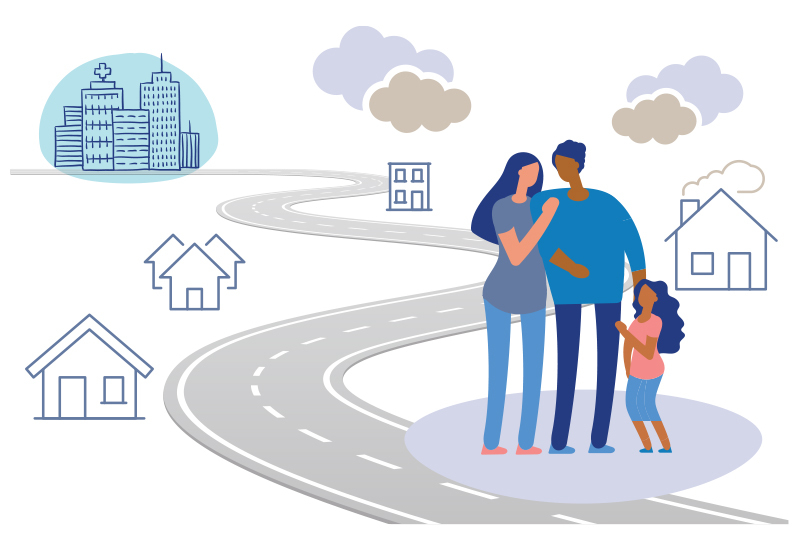What is health equity and how does it affect children?

Put simply, health equity is a commitment to ensuring every person can obtain the highest level of health possible, no matter where they live or who they are.
In 2020, many hospitals around the country — including Boston Children’s — made public commitments to health equity for their patients. This was part of a national response to racial injustice and the disparate impact COVID-19 has had on communities of color. In its Declaration on Equity, Diversity, and Inclusion, Boston Children’s established six major areas of focus to advance health equity for all patients.
Here, two Boston Children’s physicians, Dr. Katherine Peeler, the director of diversity, equity, and inclusion of Medical Critical Care, and Dr. Valerie L. Ward, chief equity and inclusion officer and a pediatric radiologist, talk about the importance of health equity.
How does a lack of health equity affect children?
Dr. Peeler: Health disparities that begin in childhood often follow people throughout their lives. If a child doesn’t receive developmental care for a disability such as autism or hearing loss, or if a child has a chronic disease like asthma or diabetes that’s not well controlled, they’re much less likely to thrive.
What are some examples of health disparities?
Dr. Peeler: Health disparities show up in many different ways. One of them is access to care. Instead of criticizing people who don’t show up for scheduled appointments, we should look at the reasons they don’t come in. Maybe the parent works two jobs. Maybe they would risk losing their job if they took the day off to bring their child to the doctor, which would have a much worse effect on their child’s health.
Dr. Ward: Health care providers need to intervene with meaningful interventions at an early stage in a child’s life. These interventions are necessary to provide care so that all children can attain the necessary education, have access to care, and obtain overall equitable health outcomes.
How can health care providers improve health equity for children?
Dr. Ward: The work we do as health care providers to advance health equity is focused on many aspects and influences that go beyond just who children are and where they live. They also include societal, environmental, educational, and economic factors that can affect children’s health.
What can health care providers do to ensure underserved patients receive the best care?
Dr. Peeler: For starters, health care providers could make it easier for families to make it to their appointments with things like evening or weekend clinics. It’s also important to understand other factors that may be affecting our patients’ health. If a family is struggling to pay for food or if the electricity in the home has been shut off, that will probably affect a child’s recovery.
What is Boston Children’s doing to advance health equity?
Dr. Ward: One of our top priorities is developing a more diverse workforce. Patients are more likely to follow clinical advice and treatments when they identify with their health care provider. Creating a workforce of providers from a variety of backgrounds will enrich the variety of ideas, expertise, and experience, all of which is necessary to provide culturally effective health care.
We are working toward this goal in several ways. The hospital has several pipeline programs that support and encourage diverse young people to pursue a career in health care. We are also working with our colleagues in Human Resources to ensure there is no bias in the way we interview candidates.
Microaggressions are comments, questions, and actions that reinforce racial, ethnic, or social stereotypes. While they may be unintentional, microaggressions emphasize feelings of being an outsider.
In addition, we are actively working to make sure Boston Children’s is a place where diverse staff can thrive personally and professionally. This winter, we launched a training program that addresses microaggressions in the workplace setting. This training program provides a framework to help people recognize bias and respond when it occurs in the health care setting.
These are three examples. We are working on many other intentional and thoughtful initiatives that underscore the commitments Boston Children’s made in our Declaration on Equity, Diversity, and Inclusion.
You wrote an article calling for health equity to be part of hospital rankings. What motivated you?
Dr. Peeler: There were so many public statements about ending racism last year. That’s great, but we need to show the public we are backing up our statements with action. We thought it would be powerful if a group of doctors from highly ranked hospitals came together and said we want to be judged on health equity.
Dr. Peeler and Dr. Ward are co-authors of the recent article, Equity Metrics Should Be An Essential Component Of Hospital Rankings.
Dr. Ward: We judge hospitals on so many things, why not health equity? We know children are vulnerable. Let’s hold hospitals to a higher standard to ensure we serve all children in ways that are impactful and meaningful and advance equity in pediatric health outcomes.
Learn more about the Office of Health Equity and Inclusion at Boston Children’s and read our Declaration on Equity, Diversity, and Inclusion.
Related Posts :
-

Medical care for youth with neurodevelopmental disabilities: A call for change
According to national data, one in six children has a neurodevelopmental disability (NDD) such as autism, intellectual disability, or ADHD. ...
-

Revisiting race and ethnicity in clinical guidelines
Health care institutions often rely on clinical pathways in assessing patients and making decisions about their care. Some of these ...
-

Helping clinicians embrace family-centered rounds
If you’ve ever been hospitalized, you may have experienced this: groups of doctors coming in and talking about you ...
-

Infantile spasms: Speeding referrals for all infants
Infantile epileptic spasms syndrome (IESS), often called infantile spasms, is the most common form of epilepsy seen during infancy. Prompt ...





